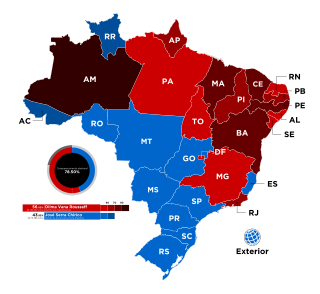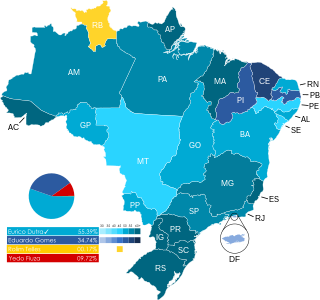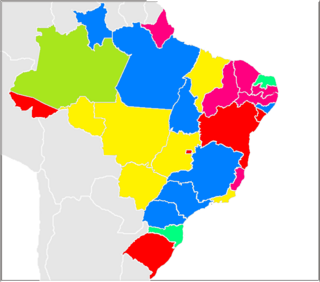The electoral threshold, or election threshold, is the minimum share of votes that a candidate or political party requires before they become entitled to representation or additional seats in a legislature.

The Workers' Party is a centre-left political party in Brazil that is currently the country's ruling party. Some scholars classify its ideology in the 21st century as social democracy, with the party shifting from a broadly socialist ideology in the 1990s, although the party retains a left-wing and marginal far-left faction to this day. Founded in 1980, PT governed at the federal level in a coalition government with several other parties from 1 January 2003 to 31 August 2016. After the 2002 parliamentary election, PT became the largest party in the Chamber of Deputies and the largest in the Federal Senate for the first time. With the highest approval rating in the history of the country at one time, President Luiz Inácio Lula da Silva was PT's most prominent member. Dilma Rousseff, also a member of PT, was elected twice but did not finish her second term due to her impeachment in 2016. The party came back to power with Lula's victory in the 2022 presidential election.

The Green Party is a political party in Brazil. It was constituted after the military dictatorship period when limitations on party development were lifted, and, like other green parties around the world, is committed to establishing a set of policies on ensuring social equity and sustainable development. One of the party's founding members was the journalist and former anti-dictatorship revolutionary Fernando Gabeira, Alfredo Sirkis and Carlos Minc. The founding of the Rio de Janeiro section of the Brazilian Green Party was led by a delegation from the southern Brazilian state of Santa Catarina, composed among others by Olga Maria Carvalho Luz, Luiz Henrique Gevaerd Odebrecht, Marcos Bayer, and Consuelo Luz Lins.

The National Congress is the legislative body of Brazil's federal government. Unlike the state legislative assemblies and municipal chambers, the Congress is bicameral, composed of the Federal Senate and the Chamber of Deputies. The Congress meets annually in Brasília from 2 February to 22 December, with a mid-term break taking place between 17 July and 1 August.

The Democratic Labour Party is a political party in Brazil.

Progressistas is a centre-right to right-wing political party in Brazil. Founded in 1995 as the Brazilian Progressive Party, it emerged from parties that were successors to ARENA, the ruling party of the Brazilian military dictatorship. A pragmatist party, it supported the governments of presidents Fernando Henrique Cardoso, Luiz Inácio Lula da Silva, Dilma Rousseff, Michel Temer and Jair Bolsonaro. Largely it was the party of the politics of Paulo Maluf, a former governor and mayor of São Paulo. Of all political parties, in corruption investigation Operation Car Wash, the Progressistas had the most convictions.

Brazil elects on the national level a head of state — the president — and a legislature. The president is elected to a four-year term by absolute majority vote through a two-round system. The National Congress has two chambers. The Chamber of Deputies has 513 members, elected to a four-year term by proportional representation. The Federal Senate has 81 members, elected to an eight-year term, with elections every four years for alternatively one-third and two-thirds of the seats. Brazil has a multi-party system, with such numerous parties that often no one party has a chance of gaining power alone, and so they must work with each other to form coalition governments.

The Brazilian Socialist Party is a political party in Brazil. It was founded in 1947, before being abolished by the military regime in 1965 and re-organised in 1989 after the re-democratisation of Brazil. It elected six Governors in 2010, becoming the second largest party in number of state governments, behind only PSDB. In addition to that, it won 34 seats in the Chamber of Deputies and three seats in the Senate, besides having been a member of the For Brazil to Keep on Changing coalition, which elected Dilma Rousseff as President of Brazil.

The Chamber of Deputies is a federal legislative body and the lower house of the National Congress of Brazil. The chamber comprises 513 deputies, who are elected by proportional representation to serve four-year terms. The current president of the chamber is the Deputy Arthur Lira (PP-AL), who was elected on 1 February 2021.
The Social Christian Party was a Christian-conservative political party in Brazil.

The Liberal Party is a far-right political party in Brazil. From its foundation in 2006 until 2019, it was called the Party of the Republic.

General elections were held in Brazil on 3 October 2010 to elect the president, National Congress and state governors. As no presidential candidate received more than 50% in the first round of voting, a second round was held on 31 October to choose a successor to Luiz Inácio Lula da Silva of the Workers' Party (PT), who was constitutionally ineligible to run for a third term as he has already served two terms after winning the elections in 2002 and being re-elected in 2006.

General elections were held in Brazil on 2 December 1945, the first since the establishment of Getúlio Vargas' Estado Novo. The presidential elections were won by Eurico Gaspar Dutra of the Social Democratic Party (PSD), whilst the PSD also won a majority of seats in both the Chamber of Deputies and the Senate. Voter turnout was 83% in the presidential election, 81% in the Chamber elections and 73% in the Senate elections.

Parliamentary elections were held in Brazil on 19 January 1947. The elections were for 19 vacant seats in the Chamber of Deputies, one additional Senator for each state, and for all state Governors and legislatures.

The 2010 Brazilian gubernatorial elections were held on Sunday, October 3, as part of the country's general election. In these elections, all 26 Brazilian states and the Federal District governorships were up for election. When none of the candidates received more than a half of the valid votes in a given state, a run-off was held on October 24, 2010 between the two candidates with the most votes. According to the Federal Constitution, Governors are elected directly to a four-year term, with a limit of two terms. Eleven governors were prohibited from seeking re-election.

David J. Brazil is a Canadian politician from Newfoundland and Labrador. He represented the district of Conception Bay East - Bell Island in the Newfoundland and Labrador House of Assembly from 2010 until 2023. He served as interim Leader of the Progressive Conservative Party of Newfoundland and Labrador and interim Leader of the Opposition from 2021 to 2023.

Parliamentary elections were held in Brazil on 15 November 1966. They were the first elections held after a military coup in 1964. In 1965 the military government of President Humberto de Alencar Castelo Branco dissolved all existing parties, and enacted a new electoral law that effectively limited the number of parties to two — the pro-government National Renewal Alliance (ARENA) and the opposition Brazilian Democratic Movement.

Parliamentary elections were held in Brazil on 15 November 1978. The pro-government National Renewal Alliance Party (ARENA) won 231 of the 420 seats in the Chamber of Deputies and 15 of the 23 seats in the Senate. Voter turnout was 82%.

Parliamentary elections were held in Brazil on 15 November 1982. The elections were conducted under the military dictatorship. Massive popular street demonstrations led the military dictatorship to stage the elections.

Parliamentary elections were held in Brazil on 15 November 1986. The Brazilian Democratic Movement Party won 260 of the 487 seats in the Chamber of Deputies and 38 of the 49 seats in the Senate. The members of both chambers elected in this election, together with the Senators elected in 1982 came together to form a Constitutional Assembly during 1987 and 1988. The Assembly produced a new constitution, which was promulgated on 5 October 1988.













